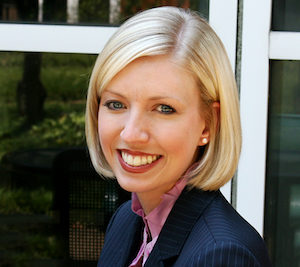By Heream Yang

Maura Clark
Consistently ranked among the top finance programs in the nation, Vanderbilt’s Master of Science in Finance (MSF) opens up doors to prestigious careers in investment banking, private equity, venture capital, management consulting, and more. The program lasts 10 months; the MSF offers a potentially lifelong return on investment.
“There’s a lot of research that supports the idea that starting your career at the right type of position is really important and has a very long-term effect,” explained Maura Clark, Director of Admissions for the MSF program. “One additional year of school could really, significantly affect your starting salary, your salary trajectory, your personal and professional happiness, and the entire trajectory of your career.”
The MSF admissions team identified 4 types of students who typically enter the program: career builders, industry switchers, liberal arts majors, and early career changers. Each has their own unique answer to the question, “Why should I get an MSF?”
Career Builders
Navigating the career search process as an undergraduate student can be overwhelming, especially at a large institution where it’s easy to get lost in the crowd. For those seeking more personalized coaching, the Vanderbilt MSF connects students with the Career Management Center several months before they step foot on campus and provides one-on-one career coaching throughout their time in the program. From deciding which industries to target to crafting a compelling resume, students are armed with the personalized career resources they need to optimize their recruiting success in the competitive finance field.
“We have this small program with a really tight network of alumni, and when you add on really strong and supportive coaching, I think that just opens up a lot of doors that students then feel really empowered to walk through because they know what they want,” Clark said.
Industry Switchers
College is a time of self-discovery, and some students who originally planned on pursuing fields like engineering or pre-med discover their love for finance late into their undergraduate careers. The MSF program offers these students a chance to catch up on technical finance skills while capitalizing on their unique undergraduate background. It also gives them another chance to recruit at major banks and financial companies if they missed that opportunity in undergrad.
“Engineering is a really good example of a really great technical background that can translate,” Clark said. “If a candidate has done some finance internships, when you add that to a mechanical engineering or chemical engineering background, that can be really successful in several different areas of finance.”
Liberal Arts Majors
Some private liberal arts universities don’t offer business or finance majors, with business-minded students opting for degrees like economics instead. As they become more familiar with the business world, some students discover their interest in finance careers as they near graduation, too late in the process to recruit for entry-level positions. Attending an MSF program prepares them with the technical skills for career success and gives them another chance to recruit within the finance industry.
“It’s a bucket of students that come from typically private institutions with a liberal arts background that don’t really know much about finance and business, and now they’re looking for that very technical finance degree,” Clark said.
Early Career Changers
Sometimes, it only takes a year or 2 in the workforce for recent college graduates to realize that their chosen industry is not the right fit. The MSF program gives these graduates the chance to pivot industries right away, whereas MBA programs, another career-changing option, often require several years of full-time experience in order to be admitted.
“I almost think of them as people who have started their career and recognize that they don’t want to continue what they’re doing, and so they kind of want a reset,” Clark explained, “They have greater career clarity now, and they want to go back and get exactly what they want because they know what that is now.”